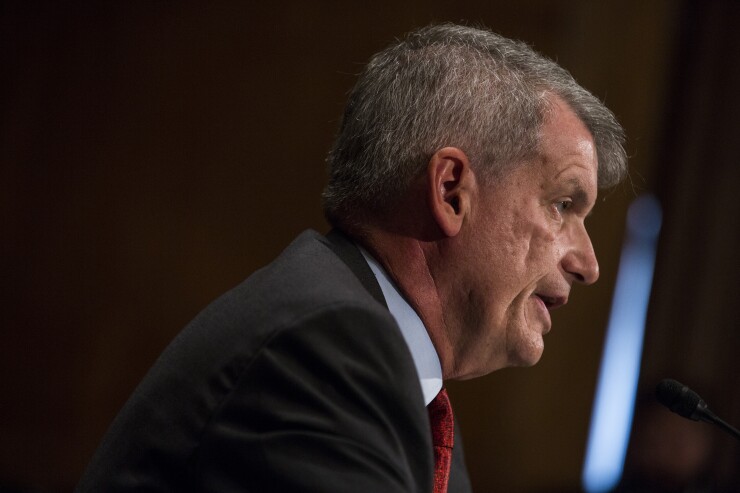Don’t expect any major turnover in the ranks of Wells Fargo’s commercial bankers following the Federal Reserve’s
That was the message from CEO Tim Sloan, who discussed the Fed order at an investor conference Tuesday morning. The central bank on Feb. 2 barred Wells from growing any larger until it
Wells has said that the Fed’s asset cap may reduce 2018 earnings by as much as $400 million. But since the surprise announcement,

Sloan said he doesn’t expect that to be a problem.
“I don’t anticipate any sort of outflow of relationship managers,” he said.
Since the Fed order was imposed a week and a half ago, Wells Fargo executives have reiterated to employees that business is operating as usual at the San Francisco bank, Sloan said. He also noted that in 2017 Wells recorded its lowest employee turnover rate in six years.
“If you communicate to our relationship managers that we’re open for business, and they see no difference in how we’re making decisions, then not only do they hear it, they believe it and they act upon it,” Sloan said.
The comments, made at a conference sponsored by Credit Suisse, offered a positive spin on a regulatory action that shocked the banking industry.
In addition to the cap on growth, the Fe
During a conference call with analysts immediately after the Fed’s announcement, Wells executives said they had
At the conference Tuesday morning, Sloan said he doesn’t expect the Fed’s order to affect Wells Fargo's core base of commercial clients.
“I actually think that commercial corporate, commercial real estate, middle-market relationships can be even stickier than consumer relationships,” Sloan said, citing the significant amount of work it takes for companies to move their treasury management to a new bank.
When asked about performance in the company’s embattled retail bank, Sloan said the work of recovering from the phony-accounts scandal is ongoing. Data from employee surveys and a “variety of reports” on consumer deposits show signs of progress, he said.
“They’re all pointing to slow but steady recovery,” Sloan said. “It’s never as fast as I would like, but it’s absolutely occurring.”
As of Dec. 31, total average deposits in the company’s community banking division increased 4% from a year earlier, to $738 billion.
After revelations of the phony-accounts scandal in late 2016, Wells began providing monthly updates to investors on retail banking activity, showing detailed metrics such as customer-initiated checking account closures. Its
When initially asked about the metrics he checks every morning to track the progress of the retail division, Sloan briefly changed the subject.
“Truth be told, when I woke up this morning, I checked the Olympics,” Sloan said, referencing the gold medal won Monday by U.S. snowboarder Chloe Kim in PyeongChang, South Korea.
“It’s amazing to me,” Sloan said, noting that he was getting off the topic.





